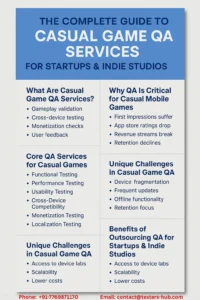The Complete Guide to Casual Game QA Services for Startups & Indie Studios
Introduction
Casual games are some of the most downloaded mobile titles worldwide. From puzzles to endless runners, they attract millions of players because they are simple, fun, and instantly engaging. However, success in this space does not come from creativity alone. If a game crashes, lags, or shows ads incorrectly, players often uninstall it within minutes. Consequently, poor quality directly translates into bad reviews, low retention, and lost revenue.
This is why mobile game testing services are so valuable. With the right QA partner, startups and indie studios can launch bug-free games that keep players entertained, improve ratings, and increase revenue. Instead of treating QA as an expense, forward-looking studios see it as an investment that drives growth.
👉 Looking for affordable mobile game testing services?
What Are Casual Game QA Services?
Casual game QA services are designed to make sure lightweight games deliver smooth, enjoyable experiences. Unlike standard apps, casual games depend on instant fun, quick rewards, and simple navigation. Therefore, every detail from touch controls to monetisation must work flawlessly.
These services include:
- Gameplay validation – confirming that scoring, levels, and controls work properly.
- Cross-device testing – ensuring stability across iOS and Android devices.
- Monetisation checks – verifying ads, rewarded videos, and in-app purchases.
- User feedback – analysing fun, engagement, and intuitive design.
In short, casual game QA goes beyond functionality. It focuses on delivering the “fun factor” while keeping performance and reliability intact.
Why QA Is Critical for Casual Mobile Games
The casual gaming market is competitive, and players have countless alternatives. As a result, studios cannot afford to ignore QA. Without mobile game testing services, common problems surface quickly:
- First impressions suffer because crashes or slow loading times frustrate players.
- App store ratings drop when early users leave negative reviews.
- Revenue streams break if ads fail to display or purchases don’t process.
- Retention declines as small bugs drive players to competitors.
Moreover, casual players are less forgiving than hardcore gamers. If the experience feels unpolished, they simply move on. Therefore, QA is essential not only for fixing bugs but also for protecting brand reputation.
Core QA Services for Casual Games
Professional game testing services cover all areas that matter to players. The most important include:
- Functional Testing – checking menus, scoring, and gameplay logic.
- Performance Testing – measuring frame rates, load times, and memory usage.
- Usability Testing – evaluating whether controls feel natural and intuitive.
- Cross-Device Compatibility – testing different screen sizes, resolutions, and OS versions.
- Monetisation Testing – confirming that ads and purchases run without errors.
- Localization Testing – verifying that translations and cultural elements are correct.
In addition, many QA teams simulate real-world conditions such as poor networks or low battery levels. This ensures games stay stable even in less-than-ideal situations.
Unique Challenges in Casual Game QA
Testing casual games might look simple, yet unique challenges often appear:
- Device fragmentation – Android and iOS have hundreds of devices and OS combinations.
- Frequent updates – quick release cycles create risks of regression.
- Offline functionality – many games must work even with weak or no internet.
- Retention focus – bugs can directly reduce daily active users.
Because of these factors, relying only on in-house testing usually falls short. On the other hand, outsourcing mobile game testing services gives startups access to broader expertise and device coverage.
Benefits of Outsourcing QA for Startups & Indie Studios
For smaller teams, outsourcing is often the smartest path. By partnering with a mobile game QA company, studios gain:
- Access to device labs without buying costly hardware.
- Scalability to add or reduce testers as needed.
- Lower costs compared to hiring full-time staff.
- Domain expertise in areas such as monetisation, multiplayer, or AR features.
- Faster releases thanks to structured processes.
Moreover, independent testers provide unbiased feedback. They evaluate gameplay from a real user’s perspective, which often uncovers issues developers overlook.
Best Practices for Outsourcing Casual Game QA
To make outsourcing effective, startups should follow these best practices:
- Start with a pilot project to check how the QA team works.
- Define requirements clearly, including devices, levels, and monetisation flows.
- Use shared tools like Jira or Trello for transparent defect tracking.
- Communicate regularly via Slack or weekly calls to avoid gaps.
- Balance automation with manual QA, since automation handles regressions while manual testing ensures fun and usability.
When followed consistently, these practices ensure outsourcing delivers both quality and value.
Conclusion
Casual mobile games succeed when they combine creativity with flawless execution. Players expect immediate fun, and they leave quickly if bugs spoil the experience. This is why outsourcing specialised mobile game testing services is such a smart move for startups and indie studios.
Instead of struggling with limited resources, smaller teams can partner with QA experts who bring devices, skills, and structured processes to the table. In return, studios gain stability, higher retention, and better app store ratings. Ultimately, QA is not just about fixing bugs; it is about creating experiences that keep players coming back.
👉 Ready to launch a polished casual game?
Frequently Asked Questions (FAQ)
Why do casual games need specialised QA services?
Because casual players expect instant fun. Even small bugs reduce retention and damage reviews, so specialised QA ensures smooth gameplay.
How do casual game QA services differ from regular mobile testing?
They focus on controls, user experience, monetisation, and “fun factor” in addition to basic functionality.
What do outsourcing costs look like?
Pricing varies depending on devices, features, and project length. Startups can choose hourly, fixed-price, or monthly packages.
Can outsourced testers integrate with my team?
Yes, most QA partners work directly with developers using shared communication and bug-tracking tools.
Do casual games need continuous QA after launch?
Absolutely. Every update introduces new risks, and ongoing QA protects user satisfaction and revenue.











